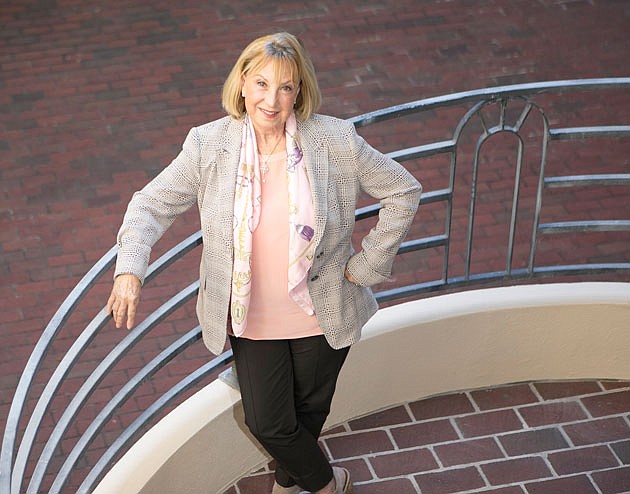- November 24, 2024
-
-
Loading

Loading

Leslie Glass vividly recalls the gasps in the ballroom in 2011, when, standing in front of 400 people, she admitted she was the mother of a recovering drug addict.
A New York Times best-selling crime novelist, Glass was steadfast about her goal: to use the debut of a documentary she produced, “The Secret World of Recovery,” to shine a light on a world most people avoid. “We wanted to tackle this from a recovery perspective,” says Glass, “and show what it was really like.”
Six years, two documentaries and one popular website later, Glass, a Sarasota resident since 2002, has turned those gasps into Reach Out Recovery. The nonprofit, with about $500,000 a year in revenue, provides resources and education to people in addiction recovery and their loved ones. Its website, reachoutrecovery.com, is a blog and media site, with content, some written by Glass, that focuses on ending the stigma of recovery. The site reaches more than 1 million people a week.
Glass has now taken her mission to the for-profit world, where her goal, to create a Yelp-like crowdsourced grading website of recovery and treatment centers, is similarly ambitious. Her company is Recovery Guidance, at recoveryguidance.com. In addition to Yelp, Glass cites Healthgrades, a popular portal for patients to write reviews on doctors and health care providers, as a model.
The plan is to create a detailed database of recovery centers, detox facilities and hospital addiction programs nationwide, in addition to doctors, nurses, mental health therapists and other specialists. Users then rate treatment centers and caregivers on a five-star scale. The business model is to charge addiction recovery providers $100 a year for a listing.
“This is something no one else has attempted to do before,” says Glass. “We're going to disrupt the industry.”
The addiction recovery industry, says Glass, is in dire need of disruption. The most pressing reason, she says, is often times when seeking help from addictions for themselves or a loved one, people make quick and uninformed decisions. But not every recovery center is the same, says Glass — a lesson she learned with her daughter, Lindsey Glass — and it's nearly impossible to compare places without prior knowledge of the system. Some places specialize in heroin, others focus on marijuana. Some are good for teenagers, others aren't.
Another way of pitching Recovery Guidance, says Tom McLellan, a national addictions expert who works with Glass on the business, is it's a two-pronged approach: Providers get exposure through the directory and families get help with a key part of recovery. “We are trying to do for the addiction recovery field what Angie's List was able to do for home repairs,” says McLellan, deputy director of the office of National Drug Policy in the Obama Administration.
Glass says the $100 annual fee is a bargain, considering recovery centers will pay significantly for more for Google ads with a significantly smaller return on investment.
An ongoing obstacle with Recovery Guidance is data collection. The company is currently building a database for users to review and to have something with which to lure providers. The site has some 38,000 pages of data, and expects to make a big push for paid subscriptions in 2018. “Aggregating this kind of information,” says Glass, “is a real challenge.”
It's also expensive: Glass seeks investors for up to $2 million in additional capital, and $500,000 already invested has come from McLellan and other managing members of Recovery Guidance.
With the database being built out, Glass has turned to the provider side. She's recently visited state officials in Tallahassee and has met with health insurance executives. Not for sales, but to get partnerships where the state, or an insurer, will recommend facilities subscribe to Recovery Guidance. “They can't force providers to sign up,” she says, “but at least they can get them to see there is a new way to think about how they get traffic.”
(This story was updated to reflect the correct the amount of Leslie Glass' investment in Recovery Guidance.)